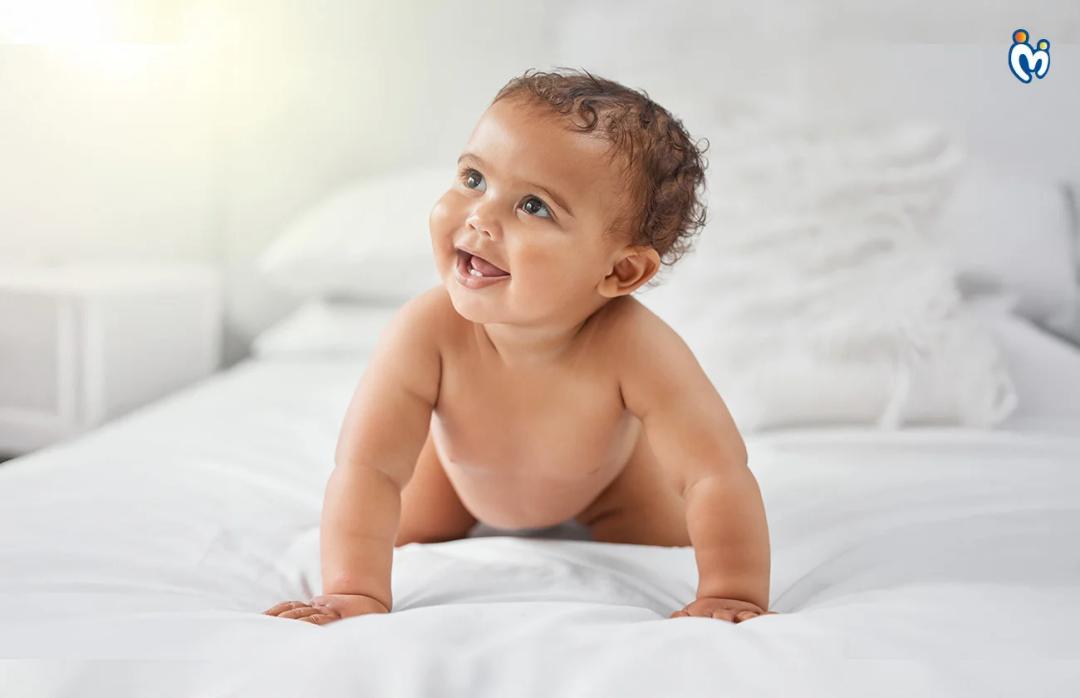New moms can often get worried about their baby’s conditions especially if anything seems out of the normal (and rightly so!). After all, babies can’t express their discomfort in ways that adults can, so it’s better to be cautious than leave things to chance or time. When it comes to the baby’s scalp, new mothers may often notice dryness and flakiness, which may or may not be accompanied by redness and itchiness. While most causes for this condition are harmless and generally subside on their own, it’s good to know how to spot the differences between different kinds of dry scalp, to decide the course of treatment. While many can be tackled at home with the proper care and home remedies, some may require medical attention.
Read on to know more about these baby scalp conditions and how to treat them:
Baby Dandruff
Baby dandruff is much like adult dandruff and can often be treated at home. This is caused due to the same conditions as in adults - that is dry weather leading to dry skin, extreme weather conditions, loss of moisture etc. If you’re feeling the cold and dryness, it’s likely that your baby will feel it too. Sunburn, using the wrong shampoo may also cause dandruff in babies. You may also notice a slight discolouration in the scalp and these flakes will feel dry and will peel off. It may also be uncomfortable for babies as the skin is dry and they may appear more agitated than usual.
To treat dandruff in babies, maintain adequate hygiene and give your baby regular baths. Ensure that the bath water is lukewarm and not too hot as hot water can further dry out the scalp. You can use a mild baby-safe shampoo to clean the scalp. However, keep bath time short as long baths can dry out the skin even more. Use a gentle oil to massage your baby’s scalp and gently brush off the flakes with a soft bristles’ brush, made for babies. If the problem still persists or if the symptoms get worse, consult your pediatrician immediately.
Cradle Cap
Cradle cap is a common occurrence in many babies and there can be many causes for the same. The way to spot the difference between baby dandruff and cradle cap is that the latter is oily to touch and does not irritate the baby’s skin or cause discomfort. Your baby won’t even feel the cradle cap. Cradle cap can be caused by excess release of sebum, a natural oil, or due to clogged sebum. It can also be caused due to a yeast infection but it is not contagious or caused due to hygiene conditions. If your baby has cradle cap, you will notice oily and crusty flakes that easily peel off when brushed or rubbed with fingers. It can also appear as spots on the baby’s scalp, neck and face.
To treat cradle cap, you can use a baby-safe shampoo to clean the scalp. You can also opt for specialized brushes that are available for babies, that gently brush off these flakes. As the flakes are oily, you can refrain from using too much oil on the scalp but do give gentle massages as that can brush off the flakes. There are also medicated cradle cap creams that you can ask your pediatrician about before using. When left to itself, cradle cap generally subsides in a few weeks.
Eczema
Baby eczema can appear the same as dandruff, though it will be more red, flaky and itchy. While cradle cap and dandruff appear mostly on the scalp, eczema can appear in other areas like folds of the skin etc. Eczema in babies also goes away on its own but may take longer to cure than dandruff or cradle cap. However, it can be itchy for babies and cause discomfort so it’s best to consult the doctor.
Eczema is usually treated the same way as dandruff or cradle cap - that is with proper washing, brushing off and creams or oils. However, if you do notice eczema in your baby, it’s best to consult your pediatrician for medicated creams and ointments.
Allergies
While it may appear as dry skin, allergies in the baby’s scalp can be noticed due to redness, sore spots or even the baby being more cranky. Allergies can be caused due to various reasons. As your baby in this stage is usually on breast milk or formula milk, the more usual causes for the allergies are baby products, dust allergy, weather changes etc.
As allergies can irritate the baby and cause discomfort, it’s best to consult your pediatrician as soon as you notice the skin condition. Moreover, the doctor will be able to diagnose the cause for the same and recommend alternate products or preventive measures to ensure that it doesn’t occur again.
While it’s good to be cautious, getting anxious or agitated over the baby's dry scalp can be avoided if one is aware of the skin conditions, as explained above. The more you know, the better you can treat the conditions. Thus make sure that you keep an eye out, stay calm and consult the doctor if it’s not treatable at home. As explained, all of these conditions can be easily treated with medicated creams, brushes or even at home, thus helping the mother stay relaxed. After all, a happy and relaxed mother can ensure the best care for her baby!
FAQ's
Q. What causes dry scalp in babies?
Ans.Dry scalp in babies can be caused by weather changes, loss of moisture, wrong shampoos, or natural skin conditions. Sometimes it may also result from dandruff, cradle cap, eczema, or allergies. Most cases are harmless, but identifying the exact cause helps in choosing the right treatment.
Q. How can I tell if my baby has dandruff?
Ans.Baby dandruff looks similar to adult dandruff—dry, flaky skin that peels off easily. It may also cause mild discoloration of the scalp. Babies may appear uncomfortable or irritated due to dryness. Unlike cradle cap, the flakes are dry, not oily, and can often be treated at home.
Q. What is cradle cap and how is it different from dandruff?
Ans.Cradle cap appears as oily, yellowish, or crusty flakes on a baby’s scalp, neck, or face. Unlike dandruff, it usually doesn’t cause irritation or discomfort. Dandruff is dry and itchy, whereas cradle cap feels greasy to touch and is caused by excess oil or sebum buildup.
Q. Can cradle cap be treated at home?
Ans.Yes, cradle cap often improves with simple care. Use a mild baby shampoo and gently brush off flakes with a baby-safe brush. Gentle scalp massages also help loosen crusty patches. Avoid using too much oil as it worsens greasiness. If severe, consult your pediatrician for medicated creams.
Q. What are the signs of baby eczema?
Ans.Baby eczema usually appears as red, itchy, and flaky patches on the scalp, face, or skin folds. Unlike cradle cap, it can cause irritation and discomfort for the baby. Though it often goes away on its own, persistent or severe eczema should be treated with pediatrician-recommended creams.
Q. How can I manage baby eczema at home?
Ans.Mild eczema can be managed with proper scalp care—using gentle baby-safe shampoo, keeping baths short, and moisturizing with safe baby oils or creams. Avoiding irritants like harsh products is also important. However, if eczema persists or worsens, seek medical advice for medicated creams or ointments for relief.
Q. Can allergies cause scalp dryness in babies?
Ans.Yes, allergies can lead to redness, soreness, or dry scalp in babies. Common triggers include baby products, dust, seasonal changes, or sensitivity to formula or breast milk. Babies may appear cranky or uncomfortable. A pediatrician can help identify the allergen and recommend suitable preventive measures or alternate products.
Q. When should I consult a doctor for baby scalp issues?
Ans.You should consult a pediatrician if scalp dryness is severe, spreading, or accompanied by redness, soreness, or discomfort. If dandruff persists despite home care, cradle cap worsens, or eczema appears itchy and painful, professional advice ensures the right treatment and rules out infections or underlying health issues.
Q. What are safe home remedies for baby dandruff?
Ans.Safe home remedies include bathing your baby with lukewarm water, using a mild shampoo, keeping bath times short, and gently massaging the scalp with baby-safe oil. After washing, use a soft baby brush to remove flakes. Always avoid harsh shampoos or long baths that dry the scalp further.
Q. How can I prevent baby scalp dryness?
Ans.To prevent dry scalp, maintain proper hygiene, use mild baby products, and keep baths short with lukewarm water. Regular scalp massages with gentle oils help lock in moisture. Protect your baby from extreme weather and avoid harsh shampoos. Staying observant ensures timely care before conditions worsen.
















